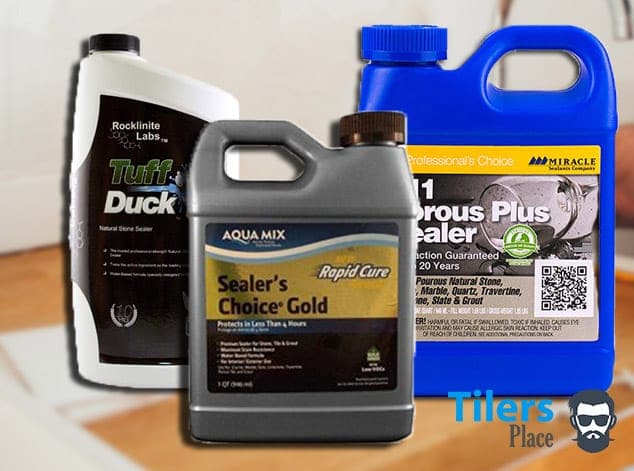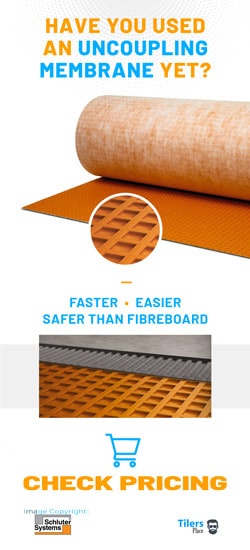Table Of Contents
Tilers Place is reader-supported. When you buy through links on this page, I may earn an affiliate commission on qualifying purchases.
Do I Need To ReSeal Grout?
So you’ve got sealed grout lines – great!
But I bet you are wondering how often do I need to reapply the grout sealer? Do I even need to apply it more than once? Is it really that necessary?
All these questions and more will be answered in this article, so let’s jump into it.
How Often Should You Seal Your Specific Grout?
The bottom line: there is no clear cut answer to how often grout sealer needs to be applied as some applications will wear away faster than others.
For example, tile grout on floors in busy areas like kitchens or showers will wear away faster than a grout sealer installed on wall tile in a toilet.
How Often Should You Seal High-Traffic Grout?
Tile and grout that are located in high traffic areas like entry way floors, showers or kitchens should be resealed with a quality grout sealer at least once a year.
That’s the official manufacturer recommendation, however, I personally recommend every six months.
Servicing your grout regularly will prevent any water absorption, dirt and contaminants entering the grout and staining it and also keeping it stronger for longer. The truth is, regular grout maintenance is easier than sporadic and random grout maintenance.
Why?
Because regular sealing ensures there’s also some product protecting the grout and when it comes to resealing time, your grout is already clean and ready to accept sealer. If you allow it to get dirty over time, you’ll need to clean it first before you can apply a sealer.
How Often Should You Seal Low-Traffic Grout?
Okay, so how about low traffic areas like guest bathrooms/showers or tiled walls that don’t experience steam or dirt?
Areas like that are much easier to maintain and you can get away with sealing every 2 years. Nice huh?
That’s because there’s nothing to wear away the grout sealer, so it remains in there, doing it’s job for longer.
Kitchen backsplashes can also be sealed less regularly if they don’t get cleaned too often from food splashes or oils. Anywhere from 5-10 years is possible from one application.
Keep in mind that household cleaning products can and will remove the protective properties of your grout sealant, so if you are wiping down your tile and grout often with chemicals, you’ll need to reseal more often.
If you notice that your tile grout is showing signs of discoloring, you’ll need to clean it first and reseal.
Not sure how to seal tile grout? Check out my handy tutorial here!
Is It Really Necessary To Seal Grout?
Grout is porous by nature. It is a mixture of cement and Portland sand with a wide variety of extra goodies like colored pigments and aggregates. (You can read more about what is grout here.) It’s a powdered substance that is by no means waterproof and so it allows moisture to penetrate deep inside it and provides a perfect home for mold colonies.
Whether you have sanded or unsanded grout, both are susceptible to water entering them alongside common staining from daily life.
Epoxy grout is a mixture of resins and hardening compounds that is waterproof and mostly stain proof, if you have that installed in your tile, you don’t ever have to seal it. Lucky you!
So to answer that question, yes – it’s very important to seal standard grout to maintain it’s strength and appearance for years to come.

Should You Seal Grout In A Shower?
Here’s some sobering facts: The average American shower uses approximately 15.8 gallons (59.8 liters). On average, they last for 7.8 minutes with an average flow rate of 2.1 gallons per minute (7.9 lpm). (Source: home-water-works.org)
That’s the use of just one person.
How many people in your family? Got any teenagers? We all know how loonnggg they spend in the shower…that’s even more water.
So what do you think 15 gallons of water constantly impacting your tile grout will do to the sealant applied to it?
Just like the soap suds, body oils and daily stress that flows down the drain, your grout sealer does too. It doesn’t happen instantly but it’s a constant erosion that consistently washes away the sealer, bit by bit.
Eventually it’ll all get washed away, leaving your grout exposed and openly susceptible to staining and mold growth.
How Many Coats Of Grout Sealer Is Needed?
The required amount of grout sealer greatly depends on what type of sealant is used and the manufacturer. Some cheaper products will require more coats to provide an adequate seal whilst professional grout sealers will only require 1 or 2.
There are two types of common sealants available:
Water-based and Solvent based grout sealers.
Water-based grout sealer
A water based grout sealer is the usual choice of most professional tilers and home owners looking to protect their grout when it’s time to reseal (or to seal initially.)
It does not alter the finish of grout lines, leaving them with their original matte finish. Some lighter grout colors can be darkened by one shade, however this is a usual by-product of sealing.
A quality water-based grout sealer will provide protection with simply 2 or 3 coats.
Solvent-based grout sealer
A solvent based grout sealer is a more potent and difficult to use grout sealer. It leaves a shiny and glossy look to grout and needs to be applied more carefully. Leaving excess sealant on the neighbouring tiles will create a messy look that will be difficult to remove once dry.
This type of sealant is not commonly used on porcelain tile installations and has more use as a natural tile sealer as it enhances the colors and protects them.
You can use this type of grout sealer on pebble floors but do note you’ll need to keep a close eye on how it’s wearing. Areas that see more use will wear away faster, leaving an uneven look with some areas shiny whilst other dulls.
This type of sealant will only need about 1-2 coats.
If you want to know more about grout sealer and which one is best, please check out my buyer’s guide and review.
Can I Apply Grout Sealer Myself?
Any homeowner can easily a grout sealer without the need of professional services like a tiler.
With a few simply tools like a grout sealer applicator, you can easily apply the product to your grout lines and enjoy clean and protected tiles for the lifetime of the installation.






Thanks Carl!